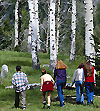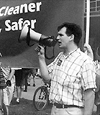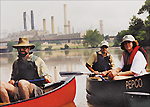|
January | February
| March | April | May
| June | July
August | September | October
| November | December
January
5: "I Love this Hat."
 Washington, D.C. -- President Clinton happily accepts a Sierra Club "Protect Our Wild Forests" hat the day after announcing the final roadless policy, which includes the protection of 60 million acres of wild forests, including the Tongass National Forest in Alaska. The plan is later put on hold by the Bush administration. Washington, D.C. -- President Clinton happily accepts a Sierra Club "Protect Our Wild Forests" hat the day after announcing the final roadless policy, which includes the protection of 60 million acres of wild forests, including the Tongass National Forest in Alaska. The plan is later put on hold by the Bush administration.
16: Everglades Airport Plan Doesn't Fly
Miami, Fla. -- The Clinton administration confirms an Air Force decision to reject a plan to build a commercial cargo and passenger airport on the former Homestead Air Base. The decision, which follows a six-year fight by Florida Chapter members, protects the nearby Everglades and Biscayne national parks from harmful noise and air pollution.
 22: Global Gag Restricts Human Rights 22: Global Gag Restricts Human Rights
Washington, D.C. -- In his first week in office, President Bush reinstates the Global Gag Rule, harming family-planning efforts worldwide. The rule cuts off U.S. funding to any international family planning organization that uses its own money to provide abortions or even talks about them, even when such efforts are paid for with non-U.S. funds.
February
4: Off the Hook
Delaware -- The National Marine Fisheries Services announces a ban on harvesting horseshoe crabs, which predate dinosaurs, in the new 1,500-square-mile Carl N. Schuster, Jr. Horseshoe Crab Reserve off the coast of Delaware. The crabs are popular as fishing bait, but will be spared, thanks to the ban, which goes into effect March 7.
27: Smoking Trucks
 Washington, D.C.-- In a unanimous decision, the Supreme Court confirms former President
Clinton's 1997 soot and smog standards, ruling against the trucking industry. The decision supports health-based standards, not cost-based as recommended by the trucking industry. Keep on truckin', but limit that exhaust. Washington, D.C.-- In a unanimous decision, the Supreme Court confirms former President
Clinton's 1997 soot and smog standards, ruling against the trucking industry. The decision supports health-based standards, not cost-based as recommended by the trucking industry. Keep on truckin', but limit that exhaust.
28: Casing the Factories
Washington, D.C. -- The Sierra Club joins the Waterkeeper Alliance as a full partner in litigation against major pork-producing operations.
March
20: Mattaponi River Avoids Diversion
 Norfolk, Va -- Norfolk District Army Corps of Engineers Col. Allen Carroll denies a permit
to build the King William Reservoir, which would flood Native American lands, harm wetlands and displace wildlife. Unfortunately, it's not the last word. A final decision by Army Corps Gen. Rhodes is expected in early 2002. Norfolk, Va -- Norfolk District Army Corps of Engineers Col. Allen Carroll denies a permit
to build the King William Reservoir, which would flood Native American lands, harm wetlands and displace wildlife. Unfortunately, it's not the last word. A final decision by Army Corps Gen. Rhodes is expected in early 2002.
27: Kaput Kyoto
 Washington, D.C. -- After President Bush declines to sign onto the Kyoto Protocol, an international treaty to help stem global warming, Environmental Protection Agency Administrator Christine Whitman announces that the Kyoto Protocol "is dead." Washington, D.C. -- After President Bush declines to sign onto the Kyoto Protocol, an international treaty to help stem global warming, Environmental Protection Agency Administrator Christine Whitman announces that the Kyoto Protocol "is dead."
27: Chief Dombeck Bows Out
Washington, D.C. -- Forest Service Chief Mike Dombeck steps down from his post citing differences with the Bush administration. Dombeck is responsible for moving the Forest Service in a new direction, away from mining and clear-cutting, and toward conservation.
April
4: Senate Clamps Down on Campaign Coffers
Washington, D.C. -- The McCain-Feingold campaign finance reform bill passes in the Senate with a margin of 59 to 41. In May, a similar bill sponsored by Reps. Shays and Meehan, is presented in the House, but is promptly ushered into committee.
21: Trek to Quebec
 Quebec City, Quebec -- Dozens of Sierra Club and Sierra Student Coalition members, including then-SSC president Camilla Feibelman, at left, speak out and march against the proposed Free Trade Area for the Americas treaty. They are among the tens of thousands kept out of the Summit of the Americas site by a two-mile-long concrete wall and chain-link fence perimeter. The Club opposes the FTAA because it would allow foreign companies to challenge domestic laws protecting the environment. Quebec City, Quebec -- Dozens of Sierra Club and Sierra Student Coalition members, including then-SSC president Camilla Feibelman, at left, speak out and march against the proposed Free Trade Area for the Americas treaty. They are among the tens of thousands kept out of the Summit of the Americas site by a two-mile-long concrete wall and chain-link fence perimeter. The Club opposes the FTAA because it would allow foreign companies to challenge domestic laws protecting the environment.
22: Tired of Pollution
 Bozeman, Mont. -- Chapter volunteers Shannon Persio and Margot Zell wrap innertubes around their heads - and join staff member Katie Craig outside a Ratdog concert to gather signatures against a proposal by a local cement kiln to burn waste tires. Bozeman, Mont. -- Chapter volunteers Shannon Persio and Margot Zell wrap innertubes around their heads - and join staff member Katie Craig outside a Ratdog concert to gather signatures against a proposal by a local cement kiln to burn waste tires.
May
9: Filling a Charity Gap
 San Francisco, Calif. -- The Sierra Club's Youth in Wilderness Program picks up the slack of a bankrupt Pacific Gas & Electric, when the utility announces that it will suspend $7 million in charitable donations. The Club donates $25,000 to the San Francisco Conservation Corps, which provides job training for disadvantaged youth. Club Executive Director Carl Pope, second from left, shakes every hand he has with SFCC representatives. San Francisco, Calif. -- The Sierra Club's Youth in Wilderness Program picks up the slack of a bankrupt Pacific Gas & Electric, when the utility announces that it will suspend $7 million in charitable donations. The Club donates $25,000 to the San Francisco Conservation Corps, which provides job training for disadvantaged youth. Club Executive Director Carl Pope, second from left, shakes every hand he has with SFCC representatives.
18: Starving for Justice
Sydney, Nova Scotia -- Elizabeth May, executive director of the Sierra Club of Canada, ends a three-week hunger strike that helps bring attention to the plight of residents living near toxic tar ponds in Sydney, her hometown. To May's relief, the government will test the residents for health problems and those who have chronic health risks will be relocated.
 20: Take Me to Your Leader 20: Take Me to Your Leader
San Francisco, Calif. -- The Sierra Club Board of Directors unanimously elects Jennifer Ferenstein of Missoula, Mont., as president. Ferenstein, at right, is the youngest woman - she's 36 - to serve as president.
21: Bikes, Feet and Automobiles
Raleigh, N.C. -- The North Carolina General Assembly passes its first smart-growth bill of 2001, ensuring that land-use planning will occur before any highway is approved and that alternative transportation, including pedestrians and bikers, will be considered in projects.
June
4: Green Bush?
Everglades National Park, Fla. -- Waving signs bearing "Bush oil and our water don't mix," dozens of Florida Chapter members gather at practically a moment's notice at Everglades National Park to demonstrate against President Bush's plan to drill for oil off Florida's coast. Bush spoke at the park in order to play up his greener, more environmental side, but Sierra Club activists showed the audience his true colors.
11: Schoolchildren Get Spoils
Washington, D.C. -- The Club releases its "Spoiled Lunch: Polluters Profiting from Federal Lunch Program" report. Taxpayers learn that their dollars are buying school lunchmeat from slaughterhouse and processing plants that consistently violate clean water and clean air regulations and labor laws. Another helping for you?
17: Club Upstages Bush's Energy Show
 St. Paul, Minn. and Lancaster, Pa. -- President Bush visits Minnesota and Pennsylvania to tout his new energy plan, which he claims is environmentally sound. But Club activists get there first, staging rallies in front of dirty plants, and frame the real story - the administration's plan won't work, it's too heavy on fossil fuels and nuclear energy, too light on energy conservation and renewables. St. Paul, Minn. and Lancaster, Pa. -- President Bush visits Minnesota and Pennsylvania to tout his new energy plan, which he claims is environmentally sound. But Club activists get there first, staging rallies in front of dirty plants, and frame the real story - the administration's plan won't work, it's too heavy on fossil fuels and nuclear energy, too light on energy conservation and renewables.
July
11: Stopping the Bombing
Austin, Texas -- With lightning speed, the Lone Star Chapter and other groups mobilize a protest against a Navy proposal for a 222,000-acre bombing range in south Texas - only to have the Navy abandon the site as "impractical." "The last thing we need is one more environmental nightmare, especially across from a federally protected national seashore," Austin volunteer Fred Richardson says of the plan.
 31: Driving the Distance on Less Gas 31: Driving the Distance on Less Gas
Washington, D.C. -- The National Academy of Sciences releases its report on fuel economy standards. Not only does the NAS report state that the technology exists to make cars and trucks go farther on a gallon of gas, it says it can be done safely and economically. Environmentalists plan to get good mileage from these findings.
August
1: GE Must Pay
Saratoga Springs, N.Y. -- Responding to years of pressure from the Sierra Club and other groups,the EPA announces that General Electric must pay for the removal by dredging of cancer-causing PCBs from the Hudson River. Before PCBs were outlawed in 1977, GE dumped more than 1.3 million pounds into the Hudson, leaving the 200-mile-long river bottom covered in poisonous chemicals.
 8: Atchafalaya Acquisition 8: Atchafalaya Acquisition
Baton Rouge, La. -- Louisiana Club members celebrate the U.S. Army Corps of Engineers' acquisition of a 50,000-acre wetland parcel in the Atchafalaya Basin, which will be restored as fish and wildlife habitat.
14: Studying Pays Off
Washington, D.C. -- After 12 years of ignoring community pressure, the D.C. Department of Health asks the Center for Disease Control to investigate health concerns in the River Terrace neighborhood near the PEPCO power plant. The timing is no coincidence. The next day, 40 neighborhood residents, joined by the American Cancer Society, the Ward 8 Coalition and the Sierra Club, release the results of their own study, detailing rates of asthma and cancer three to five times the national average. At left, D.C. Chapter members canoe in front of the power plant.
September
6: Roadless Redux
Salt Lake City, Utah -- The Sierra Club, represented by President Jennifer Ferenstein, and other environmental groups deliver 500,000 letters and cards to the federal building in support of protecting roadless areas in our national forests. The Bush administration had opened a new 60-day comment period in the hope of generating more support for logging and mining, but the public was just as supportive of roadless area protection as in previous comment periods.
6: Burn That Book
Austin, Texas -- At a Texas Board of Education hearing, religious-right groups criticize proposed science textbooks as "pro-environment," saying that topics such as global warming, acid rain and rainforest destruction should be removed from the books. "I think we've found the alternative fuel source that everyone is looking for and that is burning these," State Republican Executive Committee member Michael Franks tells the board.
8: E-I-E-I-O
Louisville, Ky. -- About 180 people attend the Kentucky Chapter's conference called "Old McDonald vs. Industrial Agriculture: Farmers, Safe Food and the Environment." Organizers are pleased to say that all weekend they served produce, chicken and catfish that was organic, antibiotic-free and grown on Kentucky family farms.
October
2: Monumental Confirmation
 Washington, D.C. -- The nation's capital is a far cry from the Giant Sequoia National Monument in California, but that didn't stop Judge Ricardo Urbina from protecting the 328,000-acre Clinton-era monument. Judge Urbina rejected a lawsuit that sought to take away the monument status of the Giant Sequoia area, making it susceptible to logging, mining and off-road vehicle use. Not only does Judge Urbina's decision protect the California sequoias, but it also confirms the legitimacy of Clinton-era public land protections. Washington, D.C. -- The nation's capital is a far cry from the Giant Sequoia National Monument in California, but that didn't stop Judge Ricardo Urbina from protecting the 328,000-acre Clinton-era monument. Judge Urbina rejected a lawsuit that sought to take away the monument status of the Giant Sequoia area, making it susceptible to logging, mining and off-road vehicle use. Not only does Judge Urbina's decision protect the California sequoias, but it also confirms the legitimacy of Clinton-era public land protections.
2: The Right Stuff on Capitol Hill
Washington, D.C. -- Sen. James Inhofe (R-Okla.) attaches the House-passed Bush energy plan as a rider to Defense Authorization bill. But the Senate rejects it 100 to 0, sending a solid message that it will not exploit the Sept. 11 tragedy to make bad energy policy. The House bill would give energy industries large government subsidies and open the Arctic National Wildlife Refuge for oil and gas drilling. Two subsequent attempts to attach the Bush energy plan to unrelated bills are also defeated.
16: Testing 1,2,3
Hawaii, Illinois, Kentucky, Michigan, Missouri, Ohio and Texas -- The Club announces first-time chapter grants for water quality monitoring in seven states. The sites will test for toxic chemicals, sediment, nonpoint runoff and mining impacts. Sites include Kealakekua Bay, Hawaii; the Fox, Kankakee and Kishwaukee river basins in Illinois; the Licking, Tradewater and Lower Green river basins in Kentucky; the Pine River in Michigan; the Blue, Brush, Indian, Dardenne, Peruque and River Des Pere in Missouri; Dicks Creek and the Miami river in Ohio; and the Leon and N. Bosque river basins in Texas.
25: Tour de Stench
 Calhoun, Ky. -- Aloma Dew hosts Kentucky's second annual Tour de Stench, visiting homes where the stench from adjacent factory farms is overwhelming. But it is not just the unbelievable smell that the tour highlights. This year, participants meet Howard McGregor, whose honey business and craft store have been ruined by flies and mice from nearby factory farms. Dew hopes the tour will help improve waste disposal standards and limit the number of factory farms permitted in the area. Calhoun, Ky. -- Aloma Dew hosts Kentucky's second annual Tour de Stench, visiting homes where the stench from adjacent factory farms is overwhelming. But it is not just the unbelievable smell that the tour highlights. This year, participants meet Howard McGregor, whose honey business and craft store have been ruined by flies and mice from nearby factory farms. Dew hopes the tour will help improve waste disposal standards and limit the number of factory farms permitted in the area.
November
8: Due Process Overdue
Mexico City, Mexico -- Mexican President Vicente Fox announces the release of Rodolfo Montiel and Teodoro Cabrera, two environmentalists who were wrongfully imprisoned in 1999. Under torture, Montiel and Cabrera confessed to crimes they did not commit, and despite cries of foul play, the men remained in prison. Numerous human rights groups, including the Sierra Club, expressed support for the two innocent men and applaud their release.
10: Something Wicked This Way Lurks
Memphis, Tenn. -- A new Sierra Club report, "Shelby County Terrible Ten," released today, exposes the factory sources of the toxic pollutants - more than 9 million pounds in 1999 - released into Memphis' water and air. Seven of the 10 companies are based in historically African-American communities. Local environmental justice organizer Rita Harris warns that despite having higher asthma rates and cancer deaths than the national average in their neighborhoods, most residents still don't realize the true health risks they're exposed to.
16: Highway on Hold
 Denver, Colo. -- A federal judge suspends construction on the proposed 125-mile Legacy Parkway in Utah, which would destroy some of the most important inland wetlands in the country. Although the project has been approved by the Army Corps of Engineers and Federal Highway Administration, the Club is prepared to prove that the highway is ill-conceived and should not be built. A full hearing is scheduled for March 2002. Denver, Colo. -- A federal judge suspends construction on the proposed 125-mile Legacy Parkway in Utah, which would destroy some of the most important inland wetlands in the country. Although the project has been approved by the Army Corps of Engineers and Federal Highway Administration, the Club is prepared to prove that the highway is ill-conceived and should not be built. A full hearing is scheduled for March 2002.
 16: Voice from the Past 16: Voice from the Past
Three Forks, Mont. -- As part of a press conference by the Club's Headwaters Group, Captain William Clark of the Lewis and Clark Expedition (a.k.a. Ritchie Doyle), returns to the headwaters of the Missouri River to express his shock that a local cement kiln is planning to burn tires under the guise of recycling.
December
5: Hurrah on the Hudson!
 Washington, D.c. -- Environmental Protection Administrator Christine Whitman tells General Electric to clean up its toxic mess. In August, Whitman made the initial ruling requiring GE to dredge the thousands of pounds of PCBs that it leaked into the Hudson River before the chemicals were banned in 1977. But then came a 30-day review period during which GE continued its extensive public relations campaign, denying the need to clean up the river. The cleanup, which will take place in two stages, will cost half a billion dollars. Washington, D.c. -- Environmental Protection Administrator Christine Whitman tells General Electric to clean up its toxic mess. In August, Whitman made the initial ruling requiring GE to dredge the thousands of pounds of PCBs that it leaked into the Hudson River before the chemicals were banned in 1977. But then came a 30-day review period during which GE continued its extensive public relations campaign, denying the need to clean up the river. The cleanup, which will take place in two stages, will cost half a billion dollars.
5: Pataki Goes With the Flow
New York, N.Y. -- Gov. Pataki designates the Croton watershed as a "Critical Resource Water," protecting it and its tributaries and wetlands from pollution. Home to New York's oldest reservoir system, the watershed provides drinking water for 9 million residents of New York City and Westchester County. The Club's Lower Hudson EPEC campaign, and the Croton Watershed Clean Water Coalition, of which the Club was a founding member, fought for this designation for more than two years. At left is New York City volunteer Robyn Camparo at a Clean Drinking Water Campaign event.
6: Congress Surrenders Power
Washington, D.C.-- By a 215-214 vote, the House of Representatives approves the Trade Promotion Authority Act (H.R. 3005) giving President Bush "fast-track" authority on trade issues.Under fast track, Congress cannot amend any proposed trade pact, only vote it up or down.
7: No-Fly Zone for Everglades
Miami, Fla.-- The Miami-Dade County Commission votes 8-5 to drop its lawsuit to keep a plan to build a commercial airport on the former Homestead Air Force Base adjacent to the Everglades and Biscayne national parks. The lawsuit was an effort to override former President Clinton's rejection of the plans. The area may be converted into a haven for visitors, National Park Service staff, Everglades restoration and scientific research.
Up to Top
|